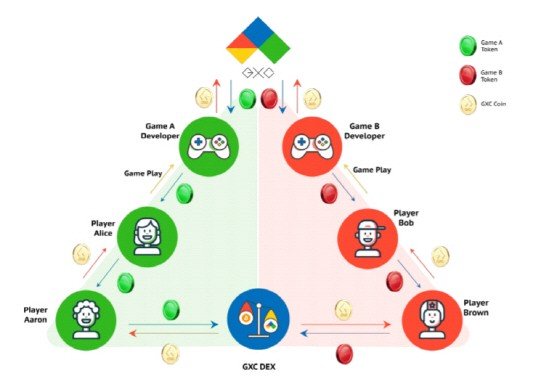The transition from console to PC then to mobile, the consumers have switched their devices quickly with the advance of technology. One industry continuously growing in midst of this rapid change is the game industry, and it is even more so in this era of blockchain technology spreading throughout the world.
The competition in game industry is becoming much fiercer than ever while the average life span of games is being reduced. Marketing cost and platform fees are burdensome to game developers which the users will eventually have to bear. The idea of blockchain technology adhere to games raise foreseeable expectations of bringing benefits to both gamers and developers.

Issuing GXC coin as a ‘key currency’ for each game tokens to increase the benefits for both gamers and developers
Blockchain projects for games are on the rise in Korea, but creating the ecosystem of connecting game and real life with blockchain to solve the dilemma of gamers and developers mentioned above, there’s none like GXC.
GXC was established in 2017, been around for 10 months, is led by Kai Kim (CEO and Founder) who has a venture experience in payment service along with software development skills. The project is also run by members of the largest blockchain research group in Korea called Decipher at Seoul National University. The CTO, Jin Yang, is also a member of this group. It is not a coincidence that this team of developers known to be experts in blockchain draws the attention.
GXC uses the distributed ledger technology to save digital assets and prevent any falsifications in games. By creating this ecosystem built on trust between gamers and developers while eliminating the intermediaries should save costs and ultimately increase benefits for both parties. Kai pointed out “The ecosystem we are trying to make is a simple one,” furthermore “GXC coin serves as a key currency among the different game tokens, that is each token can be traded with each other by exchanging GXC coin.”
For participating game developers in GXC’s ecosystem, they first need to buy GXC coin and exchange it to receive tokens for their games. It is up to the developers on how and when to issue the tokens. In-game rewards, item payments/buybacks and other types of token usages are entirely up to the developers. Developers are free to participate in ICO in a way of promotion to increase game users and profits as long as they buy GXC coin first to be used as a security deposit. The purpose of this scheme is to protect the value of tokens. For gamers, they buy the tokens to pay for items sold from games.
GXC’s DEX (Decentralized Exchange) allows game tokens to be traded with GXC coin which can be also purchased from cryptocurrency exchanges. This process is a way to enter the GXC ecosystem, and it also eliminates third party vendors for buying items while playing the game.
Partnership with popular game developers and connecting game tokens to real economy
To make this ecosystem actually work, finding games with high potential to become popular is the first step in order to increase the users. Kai admits that “partnership with good game developers is the crucial key to success,” and added that “no one know which games will become popular or not, so there will be many trials with different games.” His big picture is to test out both new games and trendy games in order to produce blockbuster hit games.
GXC is currently partnering with Neowiz Bless Studio known for making a popular game called ‘Bless’, Red Sahara a subsidiary of Bluehole that developed ‘Battle Grounds’, XLGames, SuperCreative, Entermate, and many other well-known developers in gaming industry.
As GXC’s potential is recognized even in this depressed market, GXC’s ICO gathered many participants. 20B to 27B in KRW is the target of the ICO, and many investors are attracted including both domestic and international game developers. Notably, the first ICO carried out last month was completed within one hour. According to Kai, out of 1 billion GXC coins, 40% is to be sold through ICO and 35% is for supporting the game developers.
Creating a token economy for games is not the final goal, GXC eventually wants to play a part in real economy. Kai explains that “As number of participants to our ecosystem increases with many trades, when the right time comes, we are going to make the tokens tied together with real economy. Rather than listing the coin to turn it into money, we want to partner with social commerce to release the coins through Gifticons or in-game money to maximize its utility as token.” To realize this plan, GXC has partnered with Korea Pay’s Service that provides payment solutions for mobile with 400 channels including KakaoTalk, Starbucks, Outback.
Source: EDAILY (http://www.edaily.co.kr/news/read?newsId=01344806619368984&mediaCodeNo=257&OutLnkChk=Y)